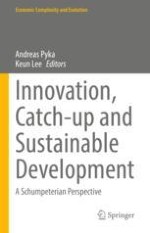2021 | OriginalPaper | Buchkapitel
Acting as an innovation niche seeder:how can the reverse salient of southeast Asian economies be overcome?
verfasst von : Hsien-Chen Lo, Ching-Yan Wu, Mei-Chih Hu
Erschienen in: Innovation, Catch-up and Sustainable Development
Aktivieren Sie unsere intelligente Suche, um passende Fachinhalte oder Patente zu finden.
Wählen Sie Textabschnitte aus um mit Künstlicher Intelligenz passenden Patente zu finden. powered by
Markieren Sie Textabschnitte, um KI-gestützt weitere passende Inhalte zu finden. powered by
